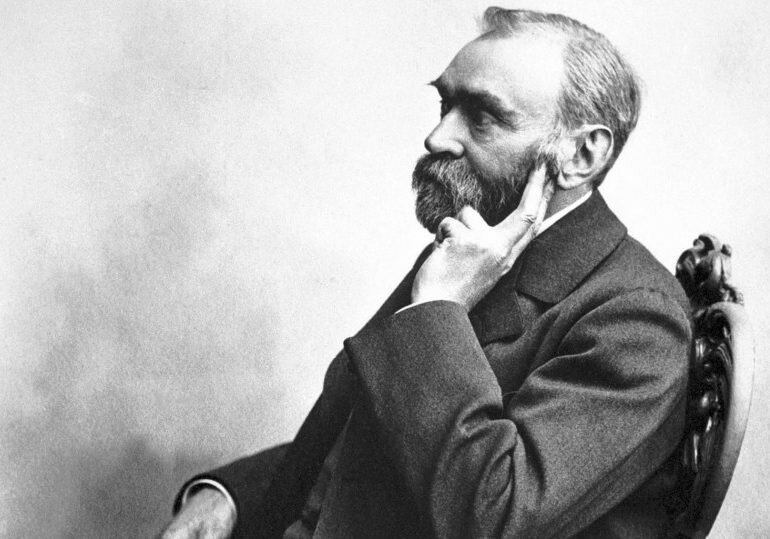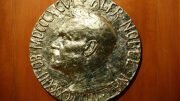The Norwegian Nobel Committee has awarded the 2021 Nobel Peace Prize to Maria Ressa and Dmitry Muratov for their journalistic efforts at safeguarding freedom of expression. This is the most publicized, some would argue most prestigious, and definitely the most controversial of the Nobel Prizes. So how did a Swedish inventor, who dealt in the manufacture of deadly weapons, come to establish this prize for the promotion of global peace?
Who was Alfred Nobel, the “Merchant of Death”?
Alfred Nobel was a Swedish chemist, inventor, and engineer who, during his lifetime, amassed a great fortune, from some 355 inventions, the most famous of which was dynamite. Born in Stockholm, in 1833, he followed his father’s footsteps into engineering. He was instrumental, by his 1894 purchase, in turning the Bofors iron mill into an armaments factory.
The late 19th century saw much of Europe descend into an arms race (which would make Nobel his fortune), the culmination of which would be the First World War (1914-1918). However, it was the death of his brother that would change his, and the world’s, future forever.
In 1888, his brother Ludvig died. Alfred was astonished to read, in a French newspaper, his own obituary, titled “The Merchant of Death.” The newspaper had mistakenly thought that Alfred, not Ludvig, had died. Disgusted at how the global opinion viewed his legacy, he was inspired to change his will and establish the Nobel Foundation.
His last will stated that his fortune should be used to establish 5 prizes – in Physics, Physiology or Medicine, Literature, Chemistry, and Peace – awarded to those that have made “the greatest benefit to mankind.”
As Norway was in a personal union with Sweden at the time, the prizes were to be split with the majority awarded in Stockholm with a sole prize, Peace, to be awarded in Oslo. The Peace Prize was to be awarded, from 1901, to those who have “done the most or the best work for fraternity between nations, for the abolition or reduction of standing armies and for the holding and promotion of peace congresses…”
Why does Norway award the Peace Prize?
There is some uncertainty about exactly why Nobel wanted Norway to manage the Peace Prize. One theory is that Norway did not have the strong militaristic traditions that Sweden possessed. Regardless of its image today, Sweden was, especially in the early modern period, a major European military power. Norway, conversely, has spent much of the past millennium being ruled (directly or indirectly) by its two closest neighbors and was often at the mercy of European realpolitik. It only reclaimed its status as an independent nation after the 1905 union dissolution referendum.
Nowadays, the Nobel Peace Prize is seen very much as a part of Norway’s global “soft power.” The awarding of the prize is a huge date on Oslo’s social calendar and sees the global media spotlight focus sharply on the Tigerstaden. The award is announced in early October but the actual ceremony takes place, in Oslo City Hall (Rådhuset) on December 10. There is also a concert held where the winner will take pride of place.

Who awards the Nobel Peace Prize?
As per Alfred Nobel’s will, Norway has the right to administer and manage the awarding of the Peace Prize. The Norwegian Nobel Committee (Den Norske Nobelkomite) is a committee of five people appointed by the Norwegian Parliament (Stortinget). The chairman and deputy chairman are elected by the committee members. The Norwegian Nobel Institute, in Oslo, houses a special meeting room for the committee meetings.
The current committee members are :
1) Berit Reiss-Andersen (66): Lawyer & former Secretary of State (AP)
2) Anne Enger (71): Former parliamentary representative and minister (SP)
3) Asle Toje (46): Former research director at the Norwegian Nobel Institute (FRP)
4) Kristin Clement (63): General manager of the think tank, Civita. Former parliamentary representative. (H)
5) Jørgen Watne Frydnes (36): General manager of Utøya AS. (AP)
The committee members are now from a broad spectrum of society, political persuasion, and age groups. It should be noted that from its formation, in 1897, until 2015, there were only 10 female members of the committee. The members are elected for a 6 year period with 3 deputies elected for a 3 year period with an option for re-election for a further 3 years. The committee members do not have to be Norwegian citizens but every single one, in the committee’s history, has been.
How does the nomination process work?
For this year’s Nobel Peace Prize there have been 329 nominations which is the third-highest total in the history of the prize. Of these 329 nominations, 234 are individuals whilst 95 organizations have been nominated.
There are strict rules and guidelines for those that have the right to nominate. The nominator must be one of the following: a member of a government or national assembly, a member of the Permanent Court of Arbitration, the International Court of Justice or the Institute of International Law, a faculty member at professor or associate professor level in history, social sciences, law, philosophy or theology, a rector or chancellor of a university, a director of a peace or international politics institute or a director of an international peace prize. Nominations must be submitted to the committee by February.
There is only one requirement to be a nominee and that is that you are nominated by an individual who has the right to nominate. The Norwegian Nobel Committee has no say on the nomination process or who can, or should, be nominated. After the deadline for nominations, there is an 8-month long process first selecting a shortlist of nominees then a vote takes place with the announcement of the winner taking place, each year, in early October.
A lack of accountability and transparency?
Without any doubt, the Nobel Peace Prize is the most controversial of the Nobel Prizes. The Norwegian Nobel Committee has a “50-year secrecy rule” whereby there is no official announcement of any of the nominees. The long list and shortlist of nominees are kept secret for 50 years from the nomination year. This means that there is a shroud of secrecy surrounding who is nominated. Furthermore, as the Committee possesses a lack of transparency or accountability there is also little knowledge of the justification for the chosen winner.
It is only now, in 2021, that we can learn the full list of nominees for the 1961 Nobel Peace Prize. Many have argued that this method of absolute secrecy needs to end in order to bring the process into the 21st century and be more open, accessible, and public.
Committee has a historical lack of diversity and too close a relationship with politics?
The history of the Nobel Peace Prize has been dominated by older Norwegian men. Though the Committee has been trying to amend this situation, by admitting younger, female, and more diverse members, for many critics it still stinks of conservatism.
Historically, a majority of the members of the Committee have had some role in Norwegian politics or governments. This has led some to argue that the Nobel Peace Prize is a sort of an indirect arm of Norwegian foreign policy. It certainly has been, somewhat, influenced by Norwegian foreign policy even though members are no longer allowed to be actively part of either a government or the Norwegian parliament.
One only has to look at the awarding of the 2010 prize to Chinese dissident Liu Xiaobo for “his long and nonviolent struggle for fundamental human rights in China.” Part of Norway’s foreign policy has always been to preach the benefits of democracy, openness, and the rule of law and this award led to a brief souring of relations between China and Norway.
Controversial decisions and winners
The decision to award Henry Kissinger and Le Duc Tho the 1973 prize was controversial as the Vietnam War was only temporarily halted. Barack Obama’s win, in 2009, was too premature and he would not only go to actively expand the Afghan war but also oversaw the controversial “drone” program which killed many civilians.
More recently, there have been calls to revoke Ethiopian Prime Minister Abiy Ahmed’s 2019 award. Despite brokering a peace between Eritrea and Ethiopia, his government has now undertaken a civil war in the Tigray region of Ethiopia.
Yet the most controversial decision by the Norwegian Nobel Committee was about a person who did not win the award. Mohandas Gandhi (Mahatma) was perhaps the pre-eminent practitioner of non-violence and the most important anti-imperialist leader of the 20th century. Despite the fact he was nominated 5 times, the last time in 1948 shortly before his untimely death, he never won the award. The Nobel Foundation admits that perhaps “…the horizon of the Norwegian Nobel Committee was too narrow? Were the committee members unable to appreciate the struggle for freedom among non-European peoples?”
The ceremony awaits…
The official ceremony for the Nobel Peace Prize takes place, in the Atrium of the University of Oslo’s Faculty of Law, on Friday, December 10 with Maria Ressa and Dmitry Muratov pocketing NOK 10 million, a gold medal, and a diploma from the Norwegian Nobel Committee.
Ressa and Muratov will not only split the prize money but will also be required to give a speech which will be broadcast worldwide on the internet.
The opinions expressed are those of the author and are not held by Norway Today unless specifically stated.
About the author:
Jonathan is a lover of the written word. He believes the best way to combat this polarization of news and politics, in our time, is by having a balanced view. Both sides of the story are equally important. He also enjoys traveling and live music.
Source: #Norway Today / #NorwayTodayNews
Do you have a news tip for Norway Today? We want to hear it. Get in touch at info@norwaytoday.no





Right. Now why was Julian Assange – WikiLeaks journalist and whistleblower still imprisoned in England – not included with the other 2, Jonathan?
Or more specifically and seriously, the Peace Committee – being a propaganda tool of the radical chic Western elites – turned its back on WikiLeaks whistleblower and journalist Julian Assange … now imprisoned by us in England.
Is this a diversion of concern and attention to preface him being murdered while in custody like Iraq war criminal fraud whistleblower Dr. David Kelly and former Serb leader Milosevic who was about to be acquitted of war crimes charged by the Hague?